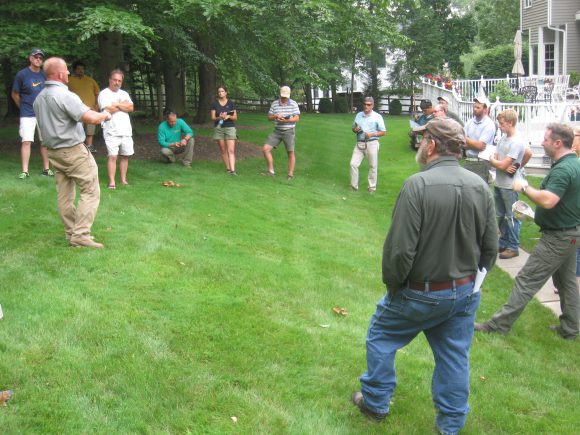
Land care professional learn to treat the landscape as a whole living system in Rutgers Organic Land Care Certificate Program.
Rutgers New Jersey Agricultural Experiment Station (NJAES) Cooperative Extension has always promoted and researched environmentally-friendly horticultural practices, and now a new publication is available to help landscapers go organic. The Rutgers Organic Land Care Best Practices Manual provides recommendations to land managers and landscape contractors on how to effectively conduct organic land care in New Jersey. Many landscapers in New Jersey have incorporated organic services into their businesses, but often there is confusion in the industry and among clients about what “going organic” actually means. This guide provides clarification and will assist industry professionals in determining what is, and what is not considered organic landscaping.
Organic land care is not simply about substituting organic-approved products for synthetic materials. In other words, just because you are using an organic pesticide on a lawn does not mean the lawn is organic. Organic land care involves treating a landscape as a whole living system where the soil, plants, and animals within that system are interdependent and should sustain each other. This type of thinking is based in ecology, which is the study of the relationships that living organisms have with each other and the nonliving environment.
When transitioning to an organic landscape, the goal should be to create a healthy lawn and garden that are self-sustaining with few material or product inputs. The goal is to eliminate the use of synthetic pesticides, synthetic fertilizers, and synthetic soil amendments.
The types of practices an organic landscaper uses involves determining soil health through soil testing and applying products only based on soil test results, raising mower blades to at least three inches to promote deep root growth, and utilizing native plants to promote biodiversity and low-maintenance turf grass varieties to conserve water.
The new manual covers site assessments, soil health, turf care, native and invasive plants, planting and caring for trees and shrubs, water conservation, weed and pest management, and wildlife control. For most topics there are recommended, and not recommended practices that landscapers can review to determine what is appropriate under an organic program.
This document is not to be confused with the United States Department of Agriculture’s National Organic Program for agriculture. That program provides federal standards for how to grow food organically which producers must adhere to in order to be certified as organic. That is not the case for landscapers. There are currently no federal standards for organic land care, although the new manual incorporates many recommendation from the federal guidance for agriculture. This document is meant to provide guidance in the absence of those standards. The manual was written by industry professionals and Rutgers faculty.
On January 31, 2017, Rutgers graduated 17 land care professionals from its Organic Land Care Certificate Program. This is the fifth year of the program which teaches basic organic land care practices to landscapers, land managers, and Rutgers Master Gardeners. One hundred individuals have gone through the program. New Jersey residents can search a Rutgers online database for local landscapers who have met the requirements of this program which is listed by county. For more information about the Rutgers Organic Land Care program or the new manual visit njaes.rutgers.edu/organiclandcare or contact Amy Rowe via email at rowe@njaes.rutgers.edu.

